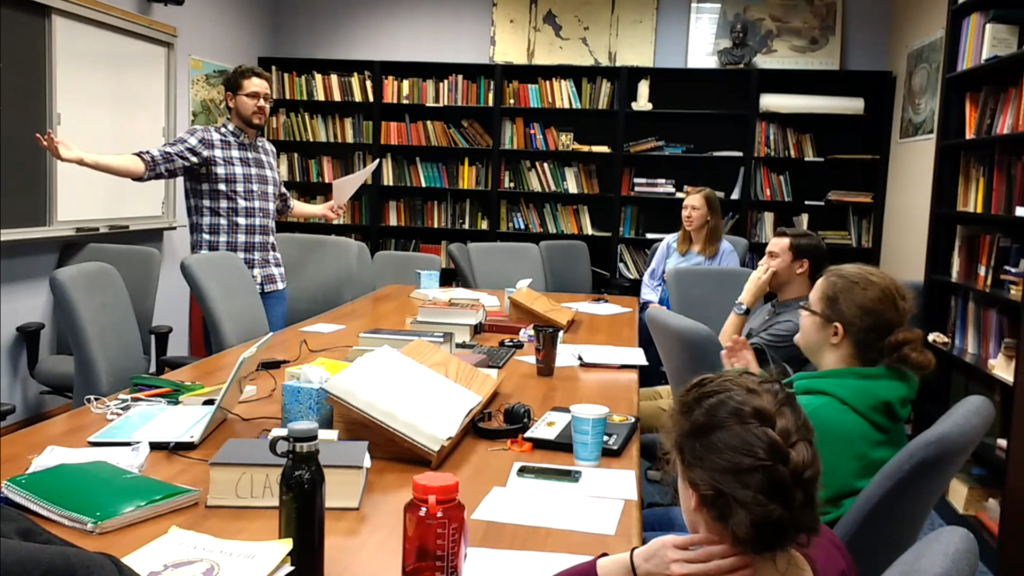
While senior John James searched for the words to describe his title within the Active Classical Languages Club, he rattled off a number of terms, all in Greek, before settling on one that he said translates to something like “prince” or “chief speaker.”
The growing club offers members a chance to speak, rather than just write, dead languages such as ancient Greek or Latin, so they can practice a skill often ignored in classes.
“The idea is sort of to get the language into habitual use, generating sentences rather than merely recognizing them,” James said. “It’s a different function in the brain, if you can recognize words in real time as someone is talking to you.”
Members of the Active Classical Languages Club gather every Thursday at 8 p.m. to practice Latin and half an hour later to practice Greek. About five to 10 students attend weekly.
James said he was inspired to dedicate more time to spoken language both by a three-week spoken Greek intensive that he participated in this summer and by Professor of Classical Studies Joseph Garnjobst, who emphasizes spoken Greek in his classes.
“It’s an experiment,” Garnjobst said of his unique approach of teaching Greek. “Bringing Greek to active use gives the students one more tool to absorb the language. They have a better idea of the thought behind the text when they use the language actively.”
He said he began this experiment in the 2015 fall semester, with rewarding results.
“We had an impromptu Platonic dialogue in Greek on the relationship between honor and virtue,” Garnjobst said. “We were able to do that because of a semester and a half of work. That makes it worth it right there.”
Last year Anne Begin ’17 reaped the benefits of spoken Greek by working with some members of the club to create and practice Greek vocabulary lists. Now Begin, who majored in the classics, is furthering her studies at the University of California, San Diego. She said she improved her language skills by working with other students here at Hillsdale.
“Being a part of a community like that is always very fun because people know different things and are interested in learning different things,” Begin said. “With classics, there are so many different facets that you can spend your whole life exploring.”
Garnjobst said studying classical languages has intrinsic value, but can also provide a combination of technical and problem-solving skills that are valuable in the workplace.
“Those together are a big win,” he said “They bring problem-solving skills to the table and find solutions where they were not previously apparent.”
He said that while some classics majors go on to attend graduate school or teach at the primary or secondary level, most do neither.
“Some marry and raise a family,” he said. “If they’re bringing their liberal arts education into raising children, that’s a success.”
James said club events are in the works, mentioning a field trip, such as shopping, that would involve instructions spoken in Greek. The club may dedicate a day to translating Koine Greek, using a familiar text from the Bible. The club has worked with fables from easy Greek readers.
“Those are great because you know when everyone gets it,” James said. “They’re like, ‘Oh, the punchline makes sense now!’”
As a classics major who said he will likely teach in the future, James explained that speaking Greek aloud helps a speaker to understand the language better, taking the language from a code to be translated to a more accessible means of thinking and speaking.
“One of the main objectives is to get common words – like ‘to be’ verbs and pronouns – to have their own slot in your brain rather than an English equivalent that you translate.”
For alumni like Begin, classical language skills translate into a better understanding of the modern West.
“By studying the Classics, you have access to so much of Western literature because everything is built on classical authors,” she said. “Reading Homer, you’re getting back to the foundation of things like the ‘Aeneid’ and then ‘Paradise Lost’ and Dante, all that stuff. So much of what you read – even in the modern world with things like Harry Potter – all harkens back to the classics.”

